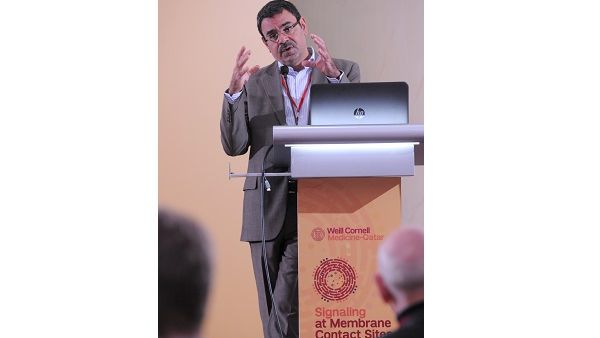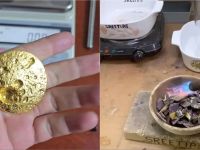WCM-Q Conference Explores Role of Cell Signaling in Disease

Some of the world’s foremost researchers investigating the mechanisms by which cells communicate with one another convened in Doha at a conference hosted by Weill Cornell Medicine-Qatar (WCM-Q).
Eighteen international experts in the field of cell signaling gave presentations at the event, explaining the very latest advances in what is a highly dynamic and complex research area. Cell signaling refers to a wide range of communication processes occurring at the cellular level, which govern many activities of cells, making life possible. Cell signaling coordinates essential cell processes like tissue repair, growth and immune response; errors in these processes are involved in many serious illnesses, including diabetes, cancer, and autoimmune diseases such as rheumatoid arthritis.
Dr. Khaled Machaca, WCM-Q’s associate dean for research and professor of physiology and biophysics, specializes in the study of the role of calcium in cell signalling. Dr. Machaca said: “Understanding the molecular mechanisms governing cellular signalling, including calcium signaling, is essential to develop novel therapies to treat diseases. Ultimately the regulation of homeostasis happens in large part at the cellular and molecular level, so such an understanding is important to tackle complex diseases and identify more effective therapies.”
The two-day ‘Signaling at Membrane Contact Sites’ conference brought expert speakers to Doha from all over the world, including Professor Ole Petersen, CBE, professor of physiology at Cardiff University, Wales, UK; Dr. Andreas Guse, director of biochemistry and molecular cell biology at University Medical Center, Hamburg-Eppendorf; Dr. Raphael Courjaret, assistant professor of research in physiology and biophysics at WCM-Q; and Dr. Richard Lewis, professor in the department of molecular and cellular physiology at Stanford University School of Medicine.
The lab of one of the speakers Dr. Stefan Feske, associate professor at the New York University School of Medicine, investigates the role of ion channels in controlling immune response, with the ultimate goal of identifying drug targets for immunotherapy. Dr. Feske said: “If you can identify modulators of ion channels that control immune cells that are involved in inflammatory response, it may be possible to manipulate these channels or their modulators to suppress inflammation and treat diseases like rheumatoid arthritis or asthma. The big challenge, as with all drugs, is to find drug targets and therapies that specifically inhibiting inflammation without causing detrimental side-effects, for instance by suppressing desirable immune responses to infections or tumors. Studying the calcium channels known as ORAI1, ORAI2 and ORAI3 and their regulators STIM1 and STIM2 helps us to define ways to modulate immune responses for therapeutic use.”
Background Information
Weill Cornell Medical College in Qatar
Weill Cornell Medicine - Qatar is a partnership between Cornell University and Qatar Foundation. It offers a comprehensive six-year medical program leading to the Cornell University M.D. degree with teaching by Cornell and Weill Cornell faculty and by physicians at Hamad Medical Corporation (HMC), Aspetar Orthopedic and Sports Medicine Hospital, the Primary Health Care Corporation, the Feto Maternal Center, and Sidra Medicine, who hold Weill Cornell appointments. Through its biomedical research program, WCM-Q is building a sustainable research community in Qatar while advancing basic science and clinical research. Through its medical college, WCM-Q seeks to provide the finest education possible for medical students, to improve health care both now and for future generations, and to provide high quality health care to the Qatari population.






